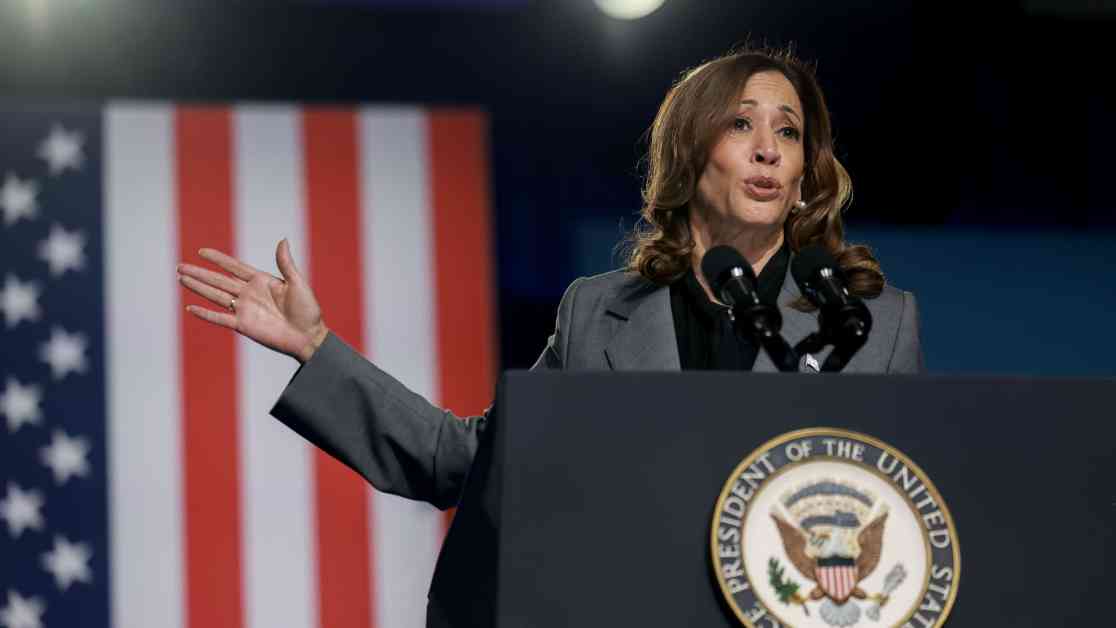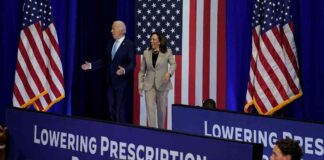U.S. Vice President Kamala Harris, the Democratic presidential nominee, made a significant appearance at the Cobb Energy Performing Arts Centre in Atlanta on September 20, 2024. During her speech, Harris focused on the crucial topics of abortion and reproductive rights in Georgia as part of her ongoing campaign against Republican presidential nominee and former U.S. President Donald Trump.
Harris’s stance on these issues aligns with the Democratic Party’s platform, emphasizing the importance of women’s rights and healthcare access. Her speech resonated with supporters and voters who prioritize these issues in their decision-making process. The event served as a platform for Harris to communicate her vision for the future of the country and differentiate her policies from those of the Republican Party.
Following her impactful speech in Atlanta, Harris expressed her willingness to engage in a second debate with former President Trump. Jen O’Malley Dillon, chair of Harris’s campaign, confirmed that Harris had accepted CNN’s invitation to a debate scheduled for October 23. This debate would take place less than two weeks before the November presidential election, providing voters with a final opportunity to hear directly from the candidates before casting their ballots.
“I will gladly accept a second presidential debate on October 23. I hope @realDonaldTrump will join me,” Harris announced on social media, signaling her readiness to engage in a constructive dialogue with her opponent. The prospect of a second debate between Harris and Trump generated significant interest among voters and political analysts, as it offered a chance to further explore the candidates’ policies and positions on key issues facing the nation.
This potential debate marks a continuation of the political rivalry between Harris and Trump, with both candidates seeking to present their visions for the country’s future and sway undecided voters. The first debate between Harris and Trump, hosted by ABC News earlier in the campaign, showcased their contrasting perspectives on various policy matters, prompting calls for a rematch from Harris’s supporters.
Despite Harris’s eagerness to engage in another debate, Trump initially declined the invitation, citing scheduling conflicts and previous commitments. In a post on his social media platform, Trump expressed his stance on the matter, stating that there would be “no third debate.” This decision sparked speculation and debate within political circles, with pundits analyzing the potential implications of Trump’s refusal to engage in a second debate with Harris.
As the campaign progressed, Harris continued to advocate for a second debate, highlighting the importance of direct engagement with her opponent to clarify policy differences and inform voters. O’Malley Dillon reiterated Harris’s commitment to participating in a debate format similar to the previous CNN event, emphasizing the need for transparency and accountability in the electoral process.
The debate between Harris and Trump carries significant weight for both candidates, as it provides a platform to address pressing issues facing the nation and present their respective policy agendas to the American public. The format and structure of the debate will allow for a meaningful exchange of ideas and perspectives, enabling voters to make informed decisions based on the candidates’ responses and positions on key issues.
Implications of the Debate
The upcoming debate between Harris and Trump has far-reaching implications for the outcome of the presidential election, as it represents a critical juncture in the campaign season. The candidates will have the opportunity to articulate their policy proposals, defend their records, and appeal to undecided voters who play a crucial role in determining the election’s outcome.
The debate will also serve as a barometer of each candidate’s ability to communicate effectively with the electorate and address complex issues facing the country. Harris’s experience as a seasoned politician and former prosecutor will be on display, showcasing her ability to navigate challenging questions and present coherent policy solutions to pressing problems.
On the other hand, Trump’s performance in the debate will be closely scrutinized, given his track record of controversial statements and confrontational rhetoric. The former president’s communication style and approach to policy issues will be under the microscope, as voters assess his suitability for a return to the highest office in the land.
Expectations and Preparations
Leading up to the debate, both Harris and Trump are expected to engage in rigorous preparations to ensure they are ready to address a wide range of topics and respond to unexpected challenges. Debate coaches and advisors will play a crucial role in helping the candidates refine their messaging, sharpen their arguments, and anticipate potential attacks from their opponent.
Harris’s team will likely focus on highlighting her policy achievements, articulating her vision for the future, and contrasting her platform with that of the Republican Party. By emphasizing her commitment to social justice, healthcare reform, and economic equality, Harris aims to appeal to a broad coalition of voters and solidify her support among key demographic groups.
Trump, on the other hand, will seek to leverage his outsider status, economic record, and America First agenda to appeal to his base and swing voters. His campaign will likely emphasize his accomplishments in office, including tax cuts, deregulation, and foreign policy initiatives, while downplaying criticisms of his leadership style and controversial statements.
Impact on Voter Decisions
The debate between Harris and Trump is expected to have a significant impact on voter decisions leading up to the November election. By providing voters with a direct comparison of the candidates’ policies, personalities, and leadership styles, the debate offers a valuable opportunity for voters to assess the candidates and make an informed choice at the ballot box.
Voters will evaluate how Harris and Trump handle tough questions, engage with each other, and present their policy proposals in a clear and compelling manner. The candidates’ ability to connect with voters, demonstrate empathy, and inspire confidence in their leadership will be critical factors influencing voter perceptions and ultimately determining the election’s outcome.
In conclusion, the upcoming debate between Vice President Kamala Harris and former President Donald Trump represents a pivotal moment in the 2024 presidential campaign. As the candidates prepare to square off on the national stage, voters will have the opportunity to assess their policies, leadership qualities, and vision for the future, shaping their decisions on Election Day. The debate will serve as a critical forum for dialogue, exchange of ideas, and democratic engagement, highlighting the importance of informed and active citizenship in shaping the nation’s future.






















